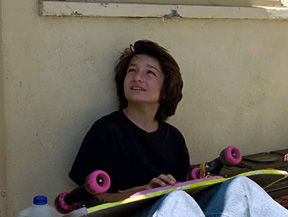|
|
Movie Review: Mid90sBy Felix QuinonezNovember 7, 2018
Then there’s fourth grade (Ryder McLaughlin) who doesn’t leave much of an impression. His sole purpose seems to be there for the ultimate, not entirely earned resolution when his love of filming everything is awkwardly used to serve up the movie’s overly earnest coda. And lastly is Ruben (Gio Galicia), who serves as Stevie’s entryway into the group. Because, Ruben is the youngest of the crew, he is welcoming to Stevie, mostly because he wants someone to be lower on the food chain than him. The story itself, isn’t very intricate or deep but it doesn’t really need to be. Besides, we can all relate to the socially awkward 13-year-old who wants, desperately, to be accepted by the “cool” kids. And from there on, Mid90s sort of meanders along on a “one summer that changed everything” path that so many movies have taken before. It, at times, feel aimless but that works to the movie’s advantage as it is that exact aimlessness that so often defines youth. Although the performances are amateurish that mostly works in the movie’s favor and fits within its aesthetic. But it’s hard to overlook the fact the group of friends are thinly drawn and all serve their clearly defined roles rather than feel like fully fleshed out people. Outside of the group of friends, Stevie’s older brother, Ian (Lucas Hedges) makes the biggest impression. Stevie is so busy idolizing him to ever see how lonely Ian really is. And that’s something we are all, at one time or another, guilty of. When we put someone on a pedestal, we are actively refusing to see them as real people, choosing instead to project our own ideals and expectations on them. Although we never really know his back story the movie gives us enough so that we can fill in the details. The same could, perhaps, be said of the movie, itself. It may not always be successful but it’s clear that a lot of time and thought was spent into the cinematography of the movie. It often switches up the shooting techniques rather than sticking to one style. Unfortunately, the movie also seems to repeatedly fall back on an awkward use of long shots that appear to be there only to give scenes a vague “artsy” look. At times, it even switches up the aspect ratio to evoke a certain feel for the era by approximating the look of 90s home videos. And while this does have a certain superficial appeal, it doesn’t add anything to the story. In fact, it seems to suggest that Hill didn’t actually know what he was aiming for, instead settling for something that looked “cool.” But at the same time, this sort of on-the-fly approach works with the spirit of the movie. In the end, the movie is at its best when it lets the scenes play out and the kids do their thing but it falters when it awkwardly reaches for profundity. As you’d expect, Mid90s uses the music and other signifiers of the era to prop up the movie and elicit nostalgia but it, thankfully does so, sparingly. For the most part, it is used to enhance the scenes rather than to replace actual storytelling. And Hill’s writing demonstrates a sharp ear for dialogue that the actors, for the most part, deliver winningly. Ultimately, and surprisingly, the movie’s lack of an actual statement, turns out to be one of its biggest strengths. Mid90s is vague enough that the viewer can project their own meanings on to it. And it also captures the moment when you realize that the people you look up to and even worship are just as lost and confused as you are. That’s a powerful lesson that we are all, at one point, forced to learn and the movie handles it with subtlety and confidence. While it is tied to a very specific era, Mid90s also feels timeless and universal. There are always kids growing up, going through the same things and, perhaps most importantly, feeling as if they are the first to ever experience any of it. Felix Quinonez Jr. is an independent comic book creator living in Brooklyn, NY. His self-published comic books and graphic novels have been sold in stores in NYC and online. He is the co-editor and contributor of a comic book Anthology called Emanata. That book features the work of many other talented creators from all around the country. You can check out his comic books and read more of his writing at https://theneonbulletin.com/
|

|
|
|

|
Friday, April 26, 2024
© 2024 Box Office Prophets, a division of One Of Us, Inc.


